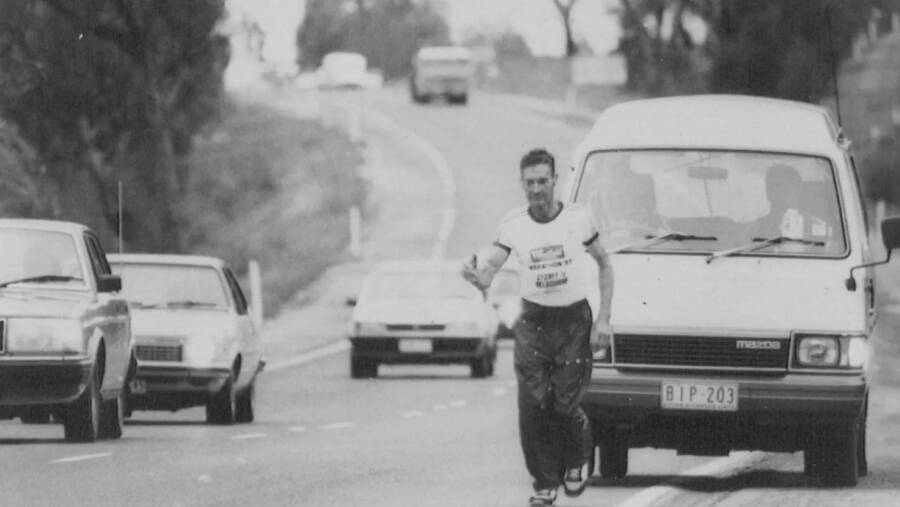1 Cor 9:24 Do you not know that those who run in a race all run, but one receives the prize? Run in such a way that you may obtain it. 25 And everyone who competes for the prize is temperate in all things. Now they do it to obtain a perishable crown, but we for an imperishable crown. 26 Therefore I run thus: not with uncertainty. Thus I fight: not as one who beats the air. 27 But I discipline my body and bring it into subjection, lest, when I have preached to others, I myself should become disqualified.
In
1983, a slow, scrawny 61-year-old Australian potato farmer named Cliff Young entered
the first Sydney to Melbourne Ultramarathon. The distance was 544 miles. You
read that right – 544 miles. Check the map below. The prize was $10,000.
To make matters worse, Cliff Young didn’t actually run in the race. Instead, he had a strange, slow running stride resembling a shuffle. So, when the Sydney to Melbourne Ultramarathon began, Young quickly fell behind and seemed on track to finish last, if at all.
But everything changed the first night of the race. In fact, by dawn on the second day, Young had a massive lead.
Young’s trainer, Wally Zeuschner, was part of the reason. Because of his poor eyesight, Zeuschner mistakenly set the alarm for 2 a.m., several hours earlier than the planned wakeup call. When the alarm rang, Young leaped up and started out. It took the groggy racer some time to realize that it was still dark. However, that was just the beginning.
By
running while the others slept, Young took the lead the first night and
maintained it for the remainder of the race. The next day he ran nonstop for 23
hours, pausing to sleep for only one hour. Running with virtually no sleep for
the entire race, Cliff crossed the finish line 10 hours ahead of the next
finisher. He had covered 544 miles in 5 days, 15 hours, and 4 minutes— the
equivalent of almost four marathons a day— shattering the previous race record
by more than two days. His style became officially known as the "Cliff Young Shuffle," and it has been imitated by other athletes in their own marathon runs.

Of course, that kind of long-range stamina did not come simply from Young’s trainer, but from Young’s own life experiences. Before the race began, he explained in an interview, “I grew up on a farm where we couldn’t afford horses or tractors. And the whole time I was growing up, whenever the storms would roll in, I’d have to go out and round up the sheep. We had 2,000 sheep on 2,000 acres. Sometimes I would have to run those sheep for two or three days. It took a long time, but I’d always catch them.”
“I
believe I can run this race.”And so he did. Imagine his relief!

By the way, Young had already decided that he would share the $10,000 prize money with his fellow runners. In that way, though he wanted to win, he wanted all his "competitors" to share the victory.
You may be curious about Young’s diet. An avid vegetarian, Young explained how eating grains and fruit powered his runs. “The secret to a long life is preserved pears and jogging,” Young told the Sydney Morning Herald. “It sure beats having a drink in the pub.”
Young also had advice for fellow older runners. “Get out of your wheelchairs and start doing a few laps, if you can,” he told the New Vegetarian and Natural Health magazine. “If you don’t get any exercise, your joints start seizing up like a rusty engine.”
Source: https://allthatsinteresting.com/cliff-young
So, how's your race progressing? Are you winning? Running to win the Christian race means …
Faith is more important than appearance, age, weight, muscles, height, or speed!
Direction is more significant than acceleration!
Remembering the cloud of witnesses, laying aside sin and weights, keeping our eyes on Jesus and his race, and persevering until the end. Heb 12:1-3
Following the rules of the race. 1 Cor 9:24-27; 2 Tim 2:5
Refusing to let others hinder us or cut in on us. Gal 5:7
Fighting the good fight, keeping the faith, and finishing the course. 2 Tim 4:7-8
Forgetting what lies behind, and pressing forward to what lies ahead. Phil 3:12-14
Determining to finish, even at the cost of our lives. Acts 20:24

.png)





































